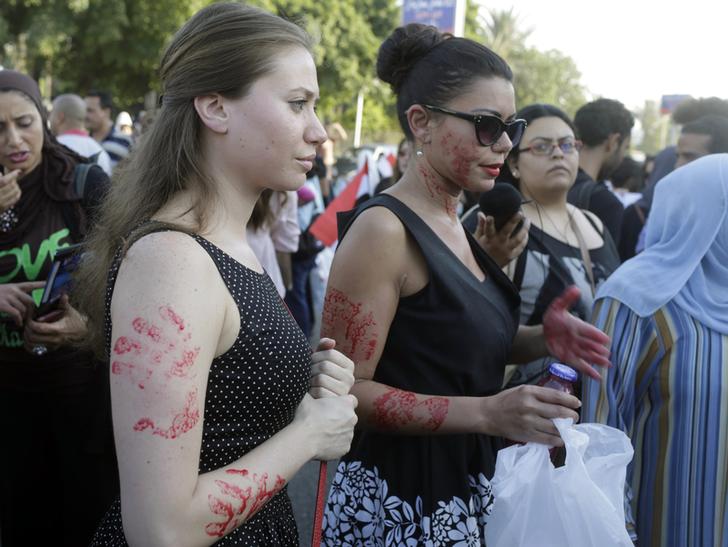Latest NEWS
- Aswat Masriya, the last word
- Roundup of Egypt's press headlines on March 15, 2017
- Roundup of Egypt's press headlines on March 14, 2017
- Former Egyptian President Hosni Mubarak to be released: lawyer
- Roundup of Egypt's press headlines on March 13, 2017
- Egypt's capital set to grow by half a million in 2017
- Egypt's wheat reserves to double with start of harvest -supply min
- Roundup of Egypt's press headlines on March 12, 2017
Activists protest sexual harassment following Tahrir group assault

Women, with red paint on their bodies to symbolize blood, protest against sexual harassment in front of the opera house in Cairo June 14, 2014. REUTERS/Asmaa Waguih
By Ola Noureldin
CAIRO, June 15 (Aswat Masriya) Tens of activists gathered in Cairo on Saturday to protest against the recurring sexual harassment cases in Egypt and demand harsher punishments.
Dressed in black, the protesters held banners that included, “Death to sexual harassers”, “Time to stop rape” and “Stop violence against women” as police forces cordoned the area.
The event was organized in response to a graphic video of a mob sexually assaulting a woman that went viral on YouTube last week. The video, now removed from YouTube as requested by the Egyptian government, was shot during celebrations of President Abdel Fattah al-Sisi's inauguration in Tahrir Square.
Dena Elshabba, the event's organizer, told Aswat Masriya that the aim of the protest was to raise awareness about sexual harassment, rape and all forms of sexual violence that take place in Egypt.
“We are born free and we should not feel scared while walking in public spaces alone. We should express ourselves the way we please and we need to be protected by the state. All state institutions must ensure that we are protected. We need a plan to fight the ignorance and lack of education that have been deeply implanted in our society,” Elshabba said.
The call for protest was also supported by a number of women’s rights and anti-sexual violence groups, including Shoft Taharosh (I Saw Harassment), Baheya Masr and Harassmap.
According to the event’s Facebook page, the protesters demand the modification and the upholding of the anti-sexual harassment law and a special police force to monitor and confront harassers on the streets and bring justice to the victims.
The protesters also demanded the establishment of rehabilitation centers for victims as well as harassers and abusers.
Mirna Sayed, another protester, said that she came to protest and demand that the law be enforced. “Harassment will not stop unless it is followed by very harsh consequences. When a harasser is punished, he sets a strong example to others,” she said.
Sayed, however, added that the current law regarding sexual harassment in the constitution is vague and needs to be modified.
Reem Fadl, a middle aged woman at the protest, also expressed her concerns, “Poverty and lack of education are the core reasons behind sexual harassment. People are living very unsatisfying lives. They run around all day to get money to feed their family ... they do not have time to raise their children well,” Fadl said.
She added that women should speak up against harassment. “It is nothing to be ashamed of. It is not [the victim's] problem and men have to start taking our side. They should try defending us instead of escorting the harassers to safety without having suffered any harsh consequences,” she said.
Mohamed Abdel Maqsood, a young man who was holding a sign reading, “Respect her”, told Aswat Masriya that he joined the protest in solidarity with all the women subjected to harassment in everyday life.
“The problem is not in the clothes, it is in the concept of male superiority that is largely evident in the Middle East. Men have to understand that women are equally human,” he said.
Abdel Maqsood added that women should not be regarded as “sexual walking objects.” He thinks that mutual respect is what will evade this phenomenon.
Holding a sign reading “Jail is where the harasser should be,” Fahima Bakr said that she was subjected to harassment from a 7-year-old boy.
“These kids lack education and are poor, everyone agrees on that, but if they suffer the consequence of doing something wrong, it will teach others a lesson. State institutions should work with civil society to stop abuse and harassment,” Bakr said.
She added that media plays an important role in objectifying women and exposing her in a way that does not suit her.
Mohamed Abdallah Nasr, known as “Tahrir’s preacher” and the curator of “Al-Azhareyoon for a Civil State” joined the protest later to make sure people know Islam is on women’s side, he said.
“This problem exists because we live in a society that degrades girls and women. If a man constantly sees women as objects, this problem will not stop. Sexual harassment needs to be targeted from a new and true religious perspective, one that respects women and perceives them as the other half of society,” Nasr said, adding that women do not belong at home.
“Women should be working and studying like men. People need to understand what their religion really says,” he said. He added that Egypt needs more cultural awareness to make sure men’s perception of women is in the right path.










